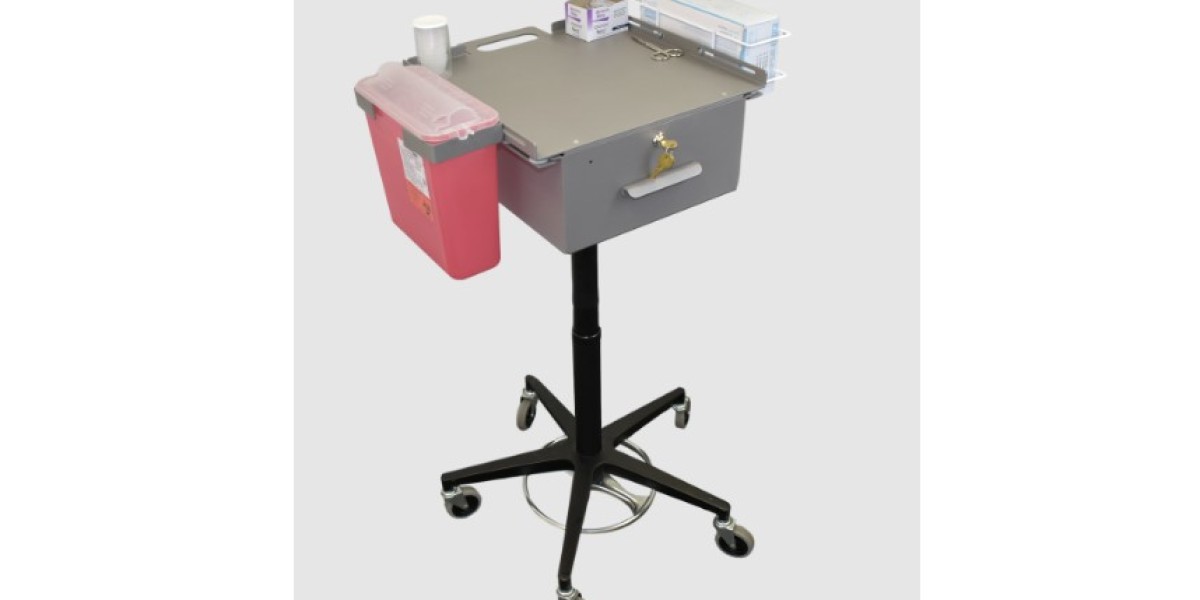Phlebotomy, the practice of drawing blood for medical testing and diagnosis, is a fundamental procedure in healthcare settings. It provides valuable insights into a patient's health, aiding in the diagnosis and treatment of various medical conditions. To facilitate this process, healthcare facilities rely on specialized equipment, including phlebotomy carts. These versatile carts play a crucial role in ensuring the efficiency, safety, and accuracy of blood collection procedures.
The Vital Role of Phlebotomy: Phlebotomy is an essential aspect of patient care, with blood samples serving as the foundation for diagnostic testing. These tests can reveal a wide range of information, from basic hematology parameters to complex biochemical markers. Timely and accurate blood collection is vital for patient diagnosis, treatment planning, and monitoring.
Challenges in Phlebotomy: Phlebotomists and healthcare professionals face various challenges in the blood collection process:
Mobility: Blood collection often involves moving from room to room, which requires a portable and organized setup.
Supplies: Phlebotomy requires a variety of supplies, including needles, syringes, tubes, labels, and alcohol swabs. Keeping these items organized and easily accessible is crucial.
Infection Control: Maintaining a sterile environment is essential to prevent the spread of infections. Proper disposal of used materials and disinfection of equipment are critical.
Patient Comfort: A well-organized and efficient phlebotomy setup contributes to a more comfortable and less stressful experience for patients.
The Role of Phlebotomy Carts: Phlebotomy cart are specially designed to address these challenges and streamline the blood collection process. Here are key features and benefits:
1. Portability: Phlebotomy carts are equipped with wheels, making them easily movable from one location to another within a healthcare facility. This mobility allows phlebotomists to reach patients wherever they are, reducing patient inconvenience and wait times.
2. Organization: These carts are designed with multiple compartments and drawers to neatly store and organize phlebotomy supplies. This ensures that all necessary items are readily available, reducing the risk of errors or delays during the procedure.
3. Infection Control: Phlebotomy carts often come with surfaces that are easy to clean and disinfect. They may also include specialized compartments for the safe disposal of used needles and other biohazard materials.
4. Ergonomic Design: The design of phlebotomy carts takes into consideration the comfort and convenience of both the phlebotomist and the patient. This includes adjustable height settings for the cart and a comfortable working surface for the phlebotomist.
5. Secure Storage: Phlebotomy carts often feature lockable compartments to secure sensitive materials, such as patient information and blood samples. This ensures patient privacy and compliance with data protection regulations.
6. Mobility Accessories: Some carts are equipped with additional accessories, such as IV poles or sharps containers, to further enhance their functionality and adaptability to different healthcare settings.
7. Enhanced Patient Experience: A well-organized and efficient phlebotomy setup, facilitated by these carts, contributes to a positive patient experience. Patients are more likely to feel at ease when the procedure is conducted smoothly and without delays.
8. Time and Resource Efficiency: Phlebotomy carts help streamline the blood collection process, saving valuable time for both healthcare professionals and patients. This efficiency translates into improved healthcare resource utilization.
In conclusion, phlebotomy carts are indispensable tools in healthcare settings, where precision, efficiency, and patient comfort are paramount. These carts address the unique challenges of blood collection by providing a portable, organized, and sterile workspace for phlebotomists. As healthcare continues to evolve, the role of phlebotomy carts in ensuring the accuracy of diagnostic testing and the well-being of patients remains as vital as ever. Their adaptability and ergonomic design contribute to a more efficient and patient-centered approach to phlebotomy, ultimately advancing the quality of care provided by healthcare facilities.
For more information, Visit us:-








